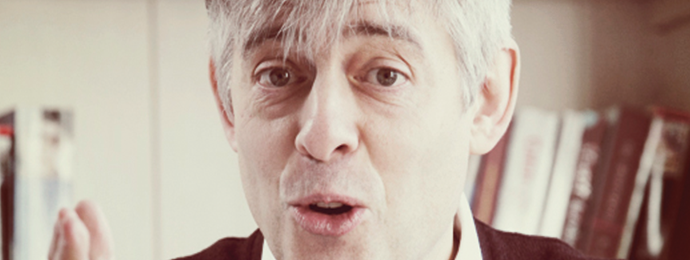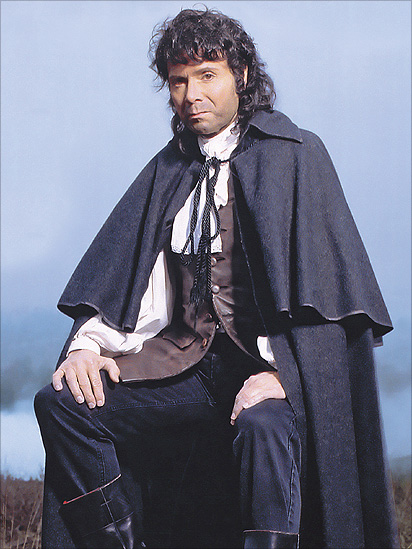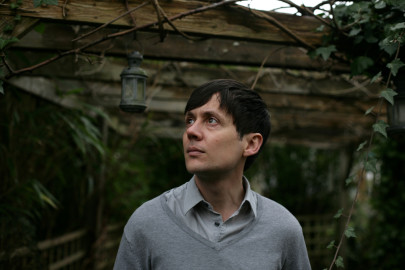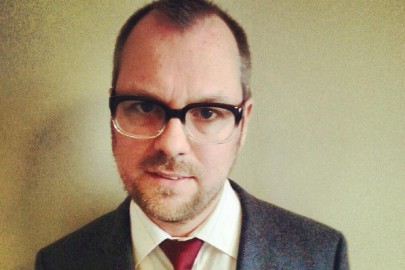
Andy Miller had a busy job in publishing, a growing family and no time at all for reading. Or so he kept telling himself.
But, no matter how busy or tired he was, something kept niggling at him. Books. Books he’d always wanted to read. Books he’d lied about having read. Books that whispered the promise of escape from the 6.44 to London. And so, he set off on a year of reading that was to transform his life completely.
The Year of Reading Dangerously is Andy’s inspirational and very funny account of his expedition through 50 books: classic, cult and everything in-between. I caught up with him to ask him more about the journey he went through to complete the mighty task.
Hi Andy. Despite initial impressions, The Year of Reading Dangerously isn’t a list of 50 books you must read is it?
No, it’s a list of fifty books I had lied about having read before I actually read them, some of which I subsequently wrote about in The Year of Reading Dangerously and some of which I didn’t. So the list is a ledger not an agenda. But I’m happy for your initial impression to be otherwise. One of the things I was trying to do in TYoRD was play around with the idea of the canon in relation to the cultural environment we currently live in – ‘the 1001 books/films/albums you must consume before you die’, all that stuff. So it was inspired by that ‘must read’ idea but then very deliberately departs from it in order to do something different and go somewhere else.
Which of the 50 books was the hardest to read?
On The Road by Jack Kerouac, The Dice Man by Luke Rhinehart and all the other American cult books I should have read when I was sixteen but didn’t because I was reading Graham Greene, George Orwell and Colin MacInnes instead, being British and gloomy. Not only were Kerouac, Thompson etc. no use to me at the age of forty, I wasn’t sorry I avoided them in the 80s either.
What books have you still to read that you are looking forward to?
You never run out of them, do you? I hope not anyway. I’m very keen on Jean Rhys at the moment – I read Tigers Are Better-Looking earlier this year; that might be the best collection of short stories I have ever read. I’ve also got a rare US first edition of Infinite Jest by David Foster Wallace I was given when it came out, the one with the misprint on the dust jacket. So I’m going finally to read that, slowly and carefully, and then stick it on eBay and buy lots more Jean Rhys books.
Which book do you think is the one that people most pretend to have read?
I don’t know. I think most people don’t set out to deceive or dissemble. Great Expectations seems to come up a lot or Wuthering Heights or Pride and Prejudice. But authors like Austen, the Brontes or Dickens are so ingrained in the culture, many of us have a working knowledge of their novels and how they write, whether we’ve actually read them or not. You can still have the conversation, can’t you? It would be weirder and rather sanctimonious to say, “Sorry, I can’t allow myself to contribute to this discussion because I haven’t actually read Wuthering Heights.” You still know who Heathcliff is i.e. Cliff Richard.

Do you think they should bother to actually read them?
Absolutely, unequivocally yes. What you think you know and what you actually know are not the same thing. And – here’s the shocking thing – those books are “classics” because they’re really, really good. So for reasons of knowledge, integrity and actual pleasure, those books deserve actually to be read by you.
Which book from the 50 would you recommend that everyone should read?
Today, Beloved by Toni Morrison. I didn’t write about it much in The Year of Reading Dangerously because it didn’t fit in terms of the narrative of the book – this happened quite a lot by the way – but I think about that novel all the time. It’s so beautifully balanced in terms of history, theme, narrative etc etc. I envy anyone who’s yet to read it, it’s completely extraordinary. But if you asked me again tomorrow, I’d say Against Nature or Anna Karenina or The Unfortunates or a dozen more. People want to know which was the best book of the fifty or my favourite or what not but actually that’s not the point of the exercise. To go back to your first question, they should all be read. TYoRD is a book about the general experience of reading, not just specific books.
Are the books you chose for your year of reading mostly ‘serious’ ones, or are there some lowbrow ones on there that you just felt like you should read as part of the undertaking?
I tried just to read what I wanted to read and not overthink it. That’s why The Dice Man was in there, also The Silver Surfer comics, Krautrocksampler by Julian Cope and so on. You must bear in mind that before I did this I’d already read lots and lots and lots of books – I love reading! – so to some extent this list is representative more of what I hadn’t read than what I had. That’s why there aren’t any Philip K. Dick novels in the fifty, for example: I’d already read dozens of them. There’s an additional list in the back of TYoRD of ‘the hundred books that influenced me the most’. Plenty of high, middle and lowbrow in there!
When you go round to someone’s house, do you find yourself secretly judging them by the books in their bookcase?
Yes. And not so secretly either. Actually, I do this more with records than books. As long as you’ve got a lot of books, I don’t really care what they are. But when it comes to music, I WILL judge you on both quantity and quality. This is probably why we don’t get invited to more dinner parties. But I’m not sorry.
What sort of books do you normally read for pleasure, and has the process of writing your book changed that?
Contemporary fiction of varying degrees of literariness and critical biographies of artists, writers and musicians. That hasn’t really changed. But I feel much more confident reading pre-20th century writing of all kinds and I must say I find those books easier to relax into, if that makes sense. As I get older I find the quest to find the ‘new thing’, to keep up with the Booker chat etc, a real distraction. I think on some level I’m trying to phase all that out. There’s more to life than We Need To Talk About Kevin.
You work in publishing and you’ve been reading all these books in your spare time too- do you find that this has diminished your love of reading for the simple joy of it?
No, quite the reverse. Ask anyone in publishing or the books pages or wherever and they’ll tell you the same thing: reading in your spare time is absolutely vital if you’re going to retain your enthusiasm for reading. The wonderful thing about reading all these books was I didn’t have to. And furthermore, the only person I was responsible to was me. I think it made me a better reader, writer and editor, if only because it reminded me of what I love about reading in the first place.
Do you have another project in the pipeline we should know about?
I’m working on a couple of ideas but I can’t tell you what they are because I’m not really sure myself yet. I’m really keen to do something with books and film and music. And I’m going to be doing a few events with Concretopia author John Grindrod next year called CROYDON TILL I DIE where, for one night only, we’ll be bringing the spirit of Croydon to your town. NB. We both come from Croydon and we are totally sincere. So stop sniggering. And watch this space.
How can people connect with you?
Through my website mill-i-am.com. I’m also on Twitter @i_am_mill_i_am. For now.
The Year of Reading Dangerously: How Fifty Great Books (and Two Not-So-Great Ones) Saved My Life is published in the UK by Fourth Estate and in the US by HarperPerennial. Buy your copy HERE.











This is a great idea. Is Finnegan’s Wake on your list?
You definitely deserve some sort of award if you managed to read On The Road and The Dice Man as a full-grown adult. Even as a teenager I found The Dice Man gruelling – a decent-ish short story idea flogged to death, buried, dug up again and its flayed corpse stretched to the length of a 19th Century Russian epic.
The Dice Man is definitely up there on my list of worst executed book ideas, truly terrible writing – although I did quite enjoy On the Road as an 18 year old.
Im just trying to think what would be on my own list… A Brief History of Time, obviously. Midnight’s Children. The God of Small Things. Moby Dick. Anything by Virginia Woolf. Henry James…
Of those four I’ve only read Midnight’s Children, which I really enjoyed but have somehow not been tempted to try a Rushdie since.
Re Woolf, I actually gave up on Mrs Dalloway about a third of the way through. I wanted to punch her internal monologue in its face (I’m not proud of that).
The best unreadable book I’ve read is definitely Ulysses, which is surprisingly readable given its unreadability.
I found On The Road risible when I read it in my 20s. Bit like Lawrence when I read him in my teens. And Steppenwolf, which I tried to read a few years ago. Interesting how those writers who have ultimately found themselves on the winning side of culture wars are the ones who seem to get left behind.
Some wise words on reading below (from here: http://www.farnamstreetblog.com/2013/05/the-buffett-formula-how-to-get-smarter/). Obvious but not pointed out very often.
I think there’s a certain class of book which if you don’t read at the age of 16 you’ll probably not get around to until you’re 60-odd. I myself have never read 1984, Catch-22, Lord of the Flies, Brave New World, To Kill a Mockingbird, or indeed Steppenwolf.
On the Road I read on a whim in my late 20s with uncomfortably mixed feelings; it seemed to me quite beautifully written, in a very American (which is to say very un-English way), and at the same time perfectly idiotic. I remember thinking, with some sadness, that without really noticing I must have grown up a bit along the way.
The collapse of Lawrence’s reputation from apotheosis in the 1970s to vilification in the feminist 80s and all-round indifference today must be one of the strangest chapters in the history of literary reputations. I continue to believe that he is one of the five or six best prose writers in English; but it’s got to the point that I no longer expect anyone to agree with me and am thoroughly astonished on the rare occasions that I do.
I’ve read all of those, loved them all and, with the probable exception of To Kill a Mockingbird, can’t really envisage being tempted to read them again.
Even Catch 22, which blew me away in my teens and which I proclaimed for years as ‘my favourite book’ would probably irritate me now. I find myself more and more wanting to read short, simple, wise novels with no Concept by women – of the kind that Nige is so good at recommending (I read ‘The Bookshop’ by Penelope Fitzgerald last week and it seemed to me a masterpiece.)
Probably the most hysterically boring ‘great book’ I’ve read all the way through is Don Quixote. Martin Amis wrote a very funny piece on its boringness which I think is included in ‘The War Against Cliche’.